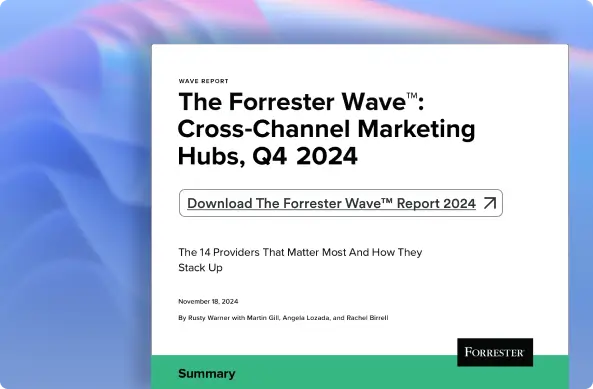How E-commerce Brands Can Build Brand Authenticity Through Online Storytelling

Reading Time: 9 minutes
Here’s a fact that will blow your mind – there exists an estimated 12 to 24 million E-commerce stores across the world. And this number is only growing with every passing day! With such stiff competition, it can be easy to drown out in the noise and slip into anonymity.
And this is where a brand story comes to the rescue.
A brand story can be the determining factor that propels a generic, run-of-the-mill website into a thriving E-commerce business. Let’s take a look at how you can capitalize on building brand authenticity through online storytelling.
What is Brand Authenticity?
In this digital age, when consumers are constantly bombarded with advertisements, they crave something that is honest and authentic. And, brand authenticity caters to this need.
Brand authenticity is all about keeping things real. It is the culmination of four key elements:
- Continuity: how the brand is faithful to itself
- Credibility: how the brand is true to its customers
- Integrity: how the brand cares about its customers and maintains responsibility for its actions
- Symbolism: how the brand supports customers in being true to themselves
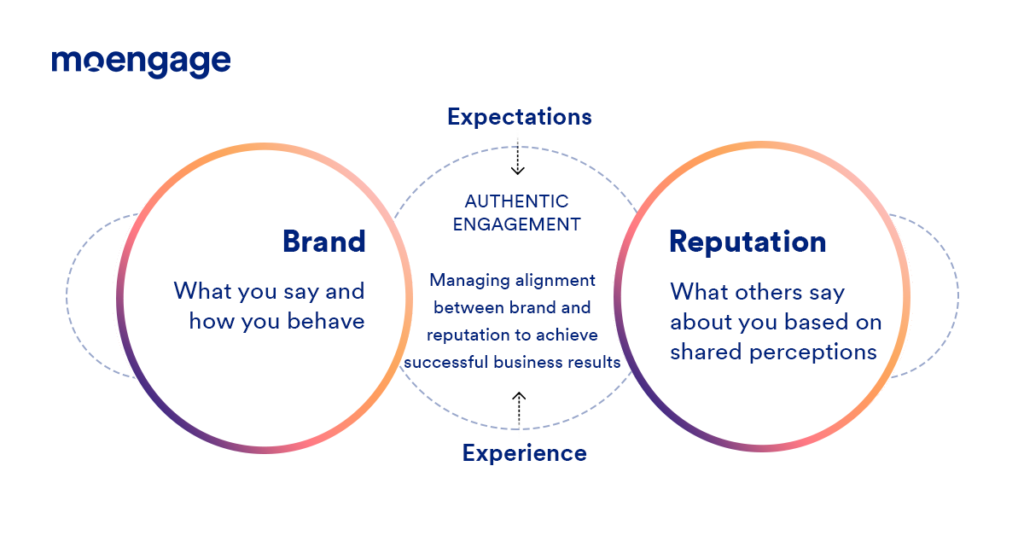
It serves as a bridge between what you say or how you behave with what others say about you and how they perceive you. It encourages honesty and transparency in sharing and acting on your mission, values, policies, and actions so that you can connect with your customers.
Why Does Brand Authenticity Matter?
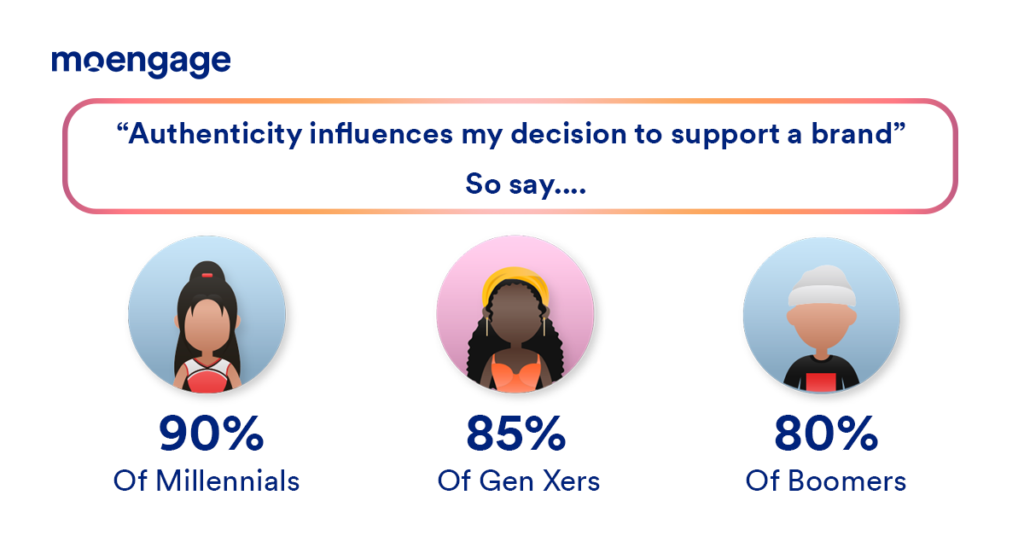
Surprisingly, your value proposition and product quality are not the only differentiators that elevate your brand above the rest. Almost 90% of consumers believe that brand authenticity is the key determining factor while choosing and sticking with brands.
In simpler words, it helps you stand out.
Here are a few more compelling reasons why you should consider investing in resources to build brand authenticity:
- It helps you tap into the power of emotional marketing while reaching out to new audiences.
- By building emotional connections with your audiences through brand authenticity, you can improve customer satisfaction.
- Your genuineness will inspire customers to spread the word about your brand through word-of-mouth marketing.
- It allows you to build long-lasting connections with your customers, which increases the customer lifetime value (LTV).
- It induces trust, which will generate long-term brand loyalty.
Guide to Building Brand Authenticity Through E-commerce Storytelling
It may be clear by now that brand authenticity is neither a fancy term nor a new concept. It is, in fact, a trend that is a reflection of modern-day consumers and their expectations. Here are some actionable ways in which you can use stories to build brand authenticity:
1. Be Genuine
At the heart of all your brand authenticity efforts lies the fact that you need to be real.
And while it may sound like no big deal, staying authentic may seem like a challenge to several businesses. The key to displaying your brand authenticity is to deep-dive into the core components of your brand’s story, some of these being:
- Who are you?
- What is the purpose of your E-commerce store?
- How does your E-commerce store fit in the market?
- What does your company stand for?
- What makes you different?
- What are the guiding principles of your venture?
Such introspective questions will lay the groundwork and act as a starting point for your brand authenticity goals. It will also help you discover the “it” factor that will be the north star for all your future actions and decisions.
2. Share Your Brand’s Main Motivator
Having a clear set of mission, vision, and purpose and sticking to them is the first step to building an authentic brand.
To elaborate on one of the aspects discussed in the previous point on staying true – you need to share your brand’s history.
What was the prime motivator that led to the launch of a new store? Did you want your E-commerce store to offer great deals and discounts? Or did you want to bypass the middlemen?
Tell it in the form of a story.
With time, it is easy to lose focus on the primary objective that drove you to start the E-commerce platform. Sharing your brand’s main motivator cycles the goal back to the roots, that is, remembering why you started off in the first place, your guiding principles, and everything you stand for.
You can share this origin story through your website’s ‘About Us’ page or in the packaging, tags, or labels of the products – sharing this story is just as crucial as developing it.
Planning to create an E-commerce brand? Here are some readily available WordPress marketplace themes. You can also check out the WordPress themes available here.
3. Develop a Unique Personality
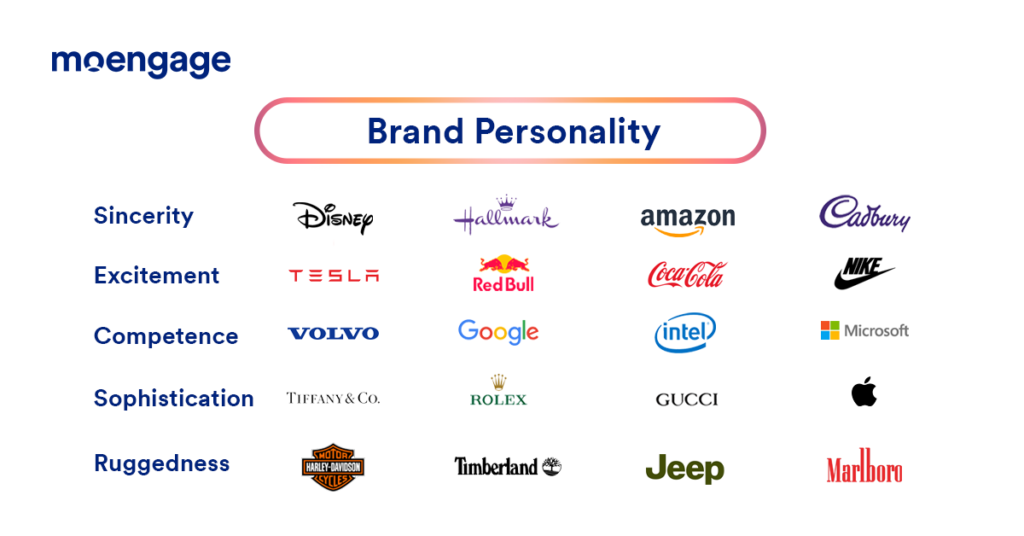
Remember, brand authenticity is one part of what you project yourself to be and the other part of how your audiences perceive you. Hence, once you have a clear understanding of what you are, you need to build a brand persona that melds with it. Your brand personality should reflect in every element that is associated with your brand.
For instance, if you are an apparel E-commerce store that wants your clothes and accessories to be associated with fun and happiness, then consider using bright and energizing colors throughout your website.
From font and typography to CTAs to content pieces – everything must align with the idea that you are here to support the consumer’s fun-loving lifestyle. If you need help creating the perfect font, you can use a font generator to maintain uniformity while sending out newsletters or designing the UX of your website.
4. Build a Simple But Relatable Story
Brands often try to develop a story to one-up their competitors. It could be in terms of product quality or customer experience, or any other USP. However, the key to a relatable brand story lies in its simplicity while answering all the ‘whys.’
Ideally, your brand story should follow the universal flow that goes something like this – a problem or customer pain point, the solution that you devised, and imminent successful results.
If your brand story manages to capture these three elements, you can create a self-contained story that conveys your core message. Do bear in mind that the final part of your story will be an ongoing process.
Keep your brand’s story short, to the point, and with minimal distractors. The key is to maintain simplicity. After all, you are building a brand story and not an M. Night Shyamalan film with layered complexities and plot twists.
5. Connect With Your Customers
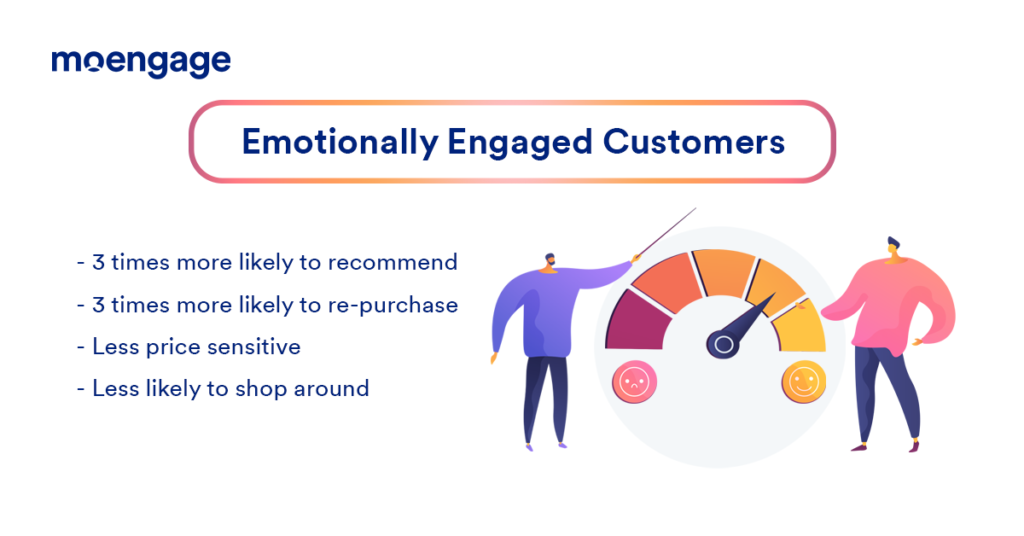
Building and nurturing trust is an essential part of brand authenticity. And it is all the more crucial for E-commerce brands since your customers cannot assess your business by visiting your establishment or checking out the products in person.
In this context, it would be beneficial to connect with your customers by sharing useful information on a wide range of topics. It could be anything, from a detailed Buyer’s Guide to answering the frequently asked questions while making purchases.
Apart from hosting these in your store, you must attempt to connect with communities on their preferred platforms like social media websites or forums. Try to become a part of the conversations surrounding the products you offer and conduct dialogues with your customers.
Maintain honesty while responding to customer queries as it will lay a solid foundation of trust. Integrating SMS into your CRM allows E-commerce brands to have personalized two-way conversations with customers, as well as keep them updated on their online orders.
6. Create High-Quality Content
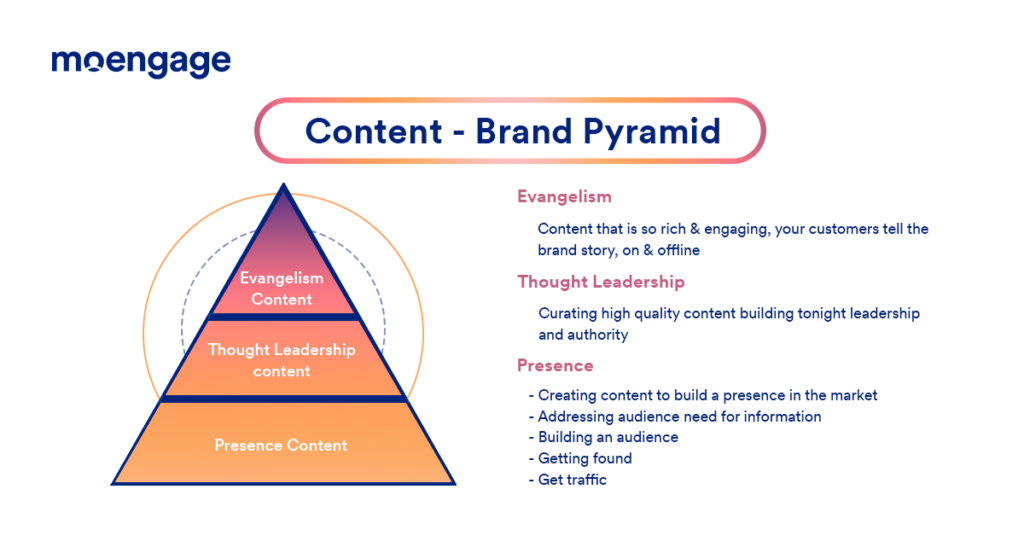
Speaking of sharing valuable information with customers, one cannot undermine the role of content in realizing these goals.
Whether it is generating a buzz around your products or empowering buyers to make the smarter choice, or sharing industry-specific information – content can achieve it all. It posits your E-commerce brand as a helpful entity that goes beyond chasing profits.
While blogs and social media posts are integral parts of standard E-commerce marketing practice, video content has been gaining traction in the past few years as the go-to content form to build brand authenticity. And for E-commerce stores, videos offer endless possibilities – product launch, product demo, explainer videos, how-to guides, and more.
Just remember to blend information with your brand personality and values, and you will have high-quality content that will delight and engage your customers.
7. Maintain Brand Consistency
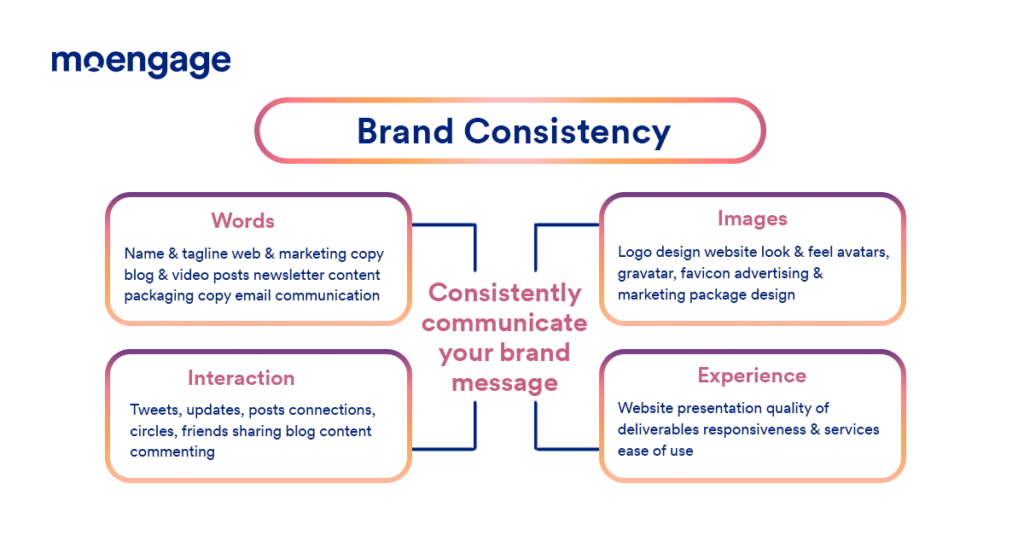
Inconsistency can undo all the efforts that you put into building your brand story. After all, brand authenticity is all about conveying a uniform message that is in line with your brand identity and values, irrespective of the medium.
In such a setting, sending mixed messages will kindle suspicion and make it harder for your customers to put their trust in your E-commerce business.
The best way to address this issue is to draft a standard branding manifesto that serves as a style guide for all brand representatives during customer interactions. Ensure that it embodies the vision and mission of your company that is the driving force behind your brand.
Hence, whether it is the tone/personality or the main value proposition, maintain consistency in all your marketing activities across various channels.
8. Show, Don’t Tell
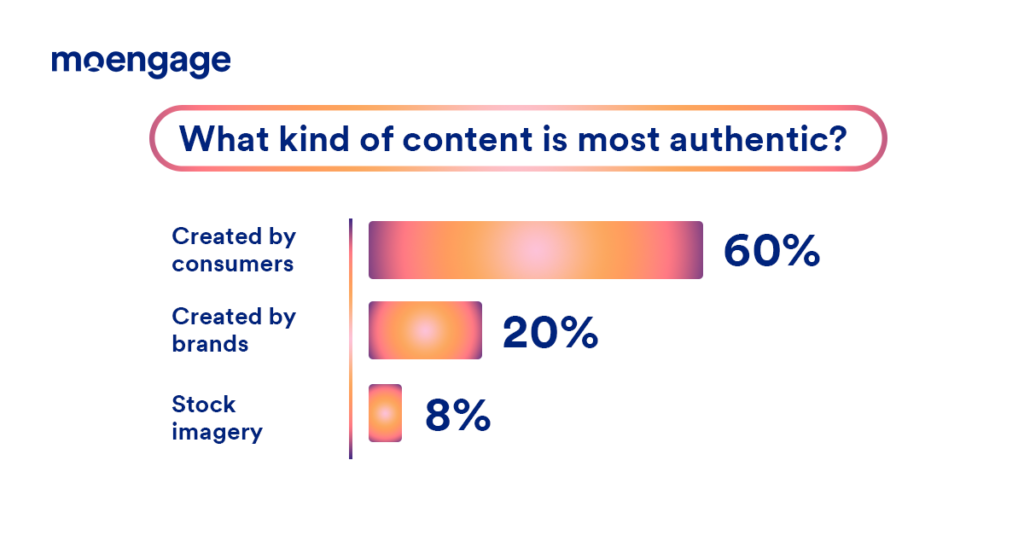
When it comes to building brand authenticity, what you do matters way more than what you say. Even if you hire the best PR managers or marketers on your team, it all boils down to delivering on your promises.
And what can be better than user-generated content to gain credibility in this sphere?
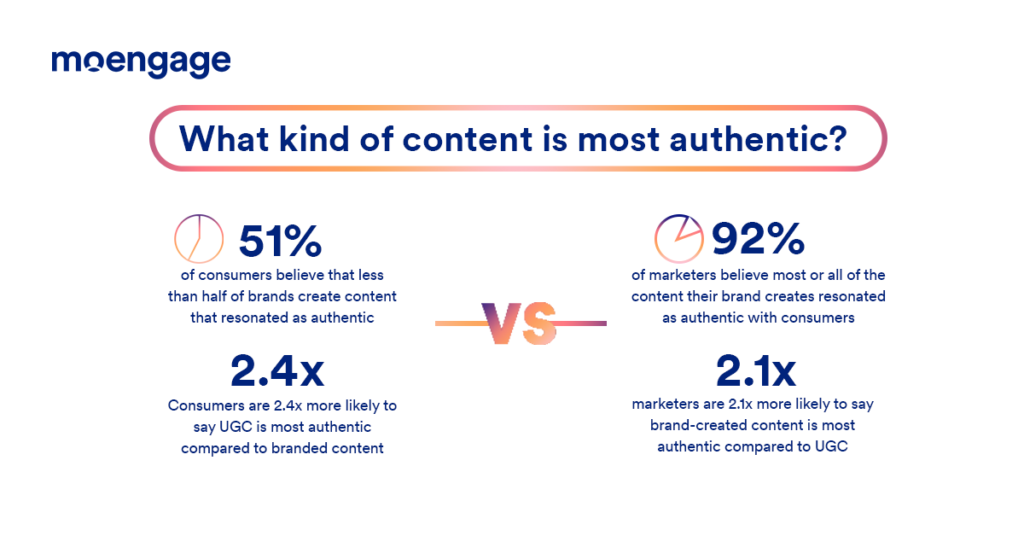
Collect and promote social proof in the form of reviews, video testimonials, and feedback and weave them into your brand story. The user-generated content could capture the product in action, its effect/impact, or a simple retelling of the customer experience. In this way, you will be creating sincere posts that focus on the customer rather than your brand.
Promoting and featuring user-generated content adds to the brand’s transparency and allows it to maintain authenticity.
9. Become a Part of Something Bigger
The modern-day consumer is more conscious and aware of their role in society. And while they purchase from brands that can add value to their life, they also seek those that are socially motivated and associated with a charitable cause.
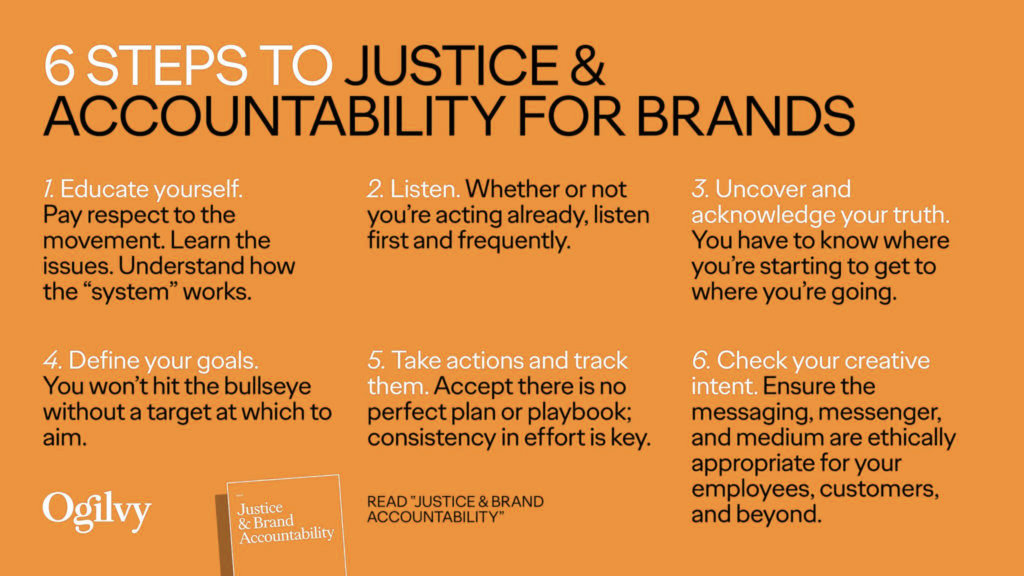
Resultantly, brands that take a stand on hard and pressing matters or advocate for a social good witness greater customer loyalty.
As such, finding a cause that lines up with your brand’s values and prompts the customers to become a part of it can help you fit into the larger picture.
There are several ways to integrate the cause with your brand story. You can partner with NGOs or build a limited-edition line of special products that raise awareness on an issue or donate a portion of your sales to the cause – let your customers know that you care much more than just making profits.
10. Accept Responsibility and Accountability
In an ideal world, your brand can do no wrong. However, nobody is perfect, and the same applies to your E-commerce business.
So rather than building an impeccable image, focus on building a brand that is human, even if it is prone to errors. Accept and admit that you can go wrong and take accountability for your actions.
Apart from issuing a heartfelt apology, share the measures that you are adopting to avoid such mistakes or catastrophic failures in the future. Some proactive action at your end can not only perform brand reputation damage control and mitigate its effects but can also help transform a potential disaster into an opportunity to build on your brand’s authenticity.
Brand Authenticity Can Translate Into Profitability
Popular brands like Nike, Patagonia, and Aerie demonstrate how stories are a powerful medium to channel your brand’s authenticity. And staying authentic benefits your E-commerce business just as much as it is advantageous to your customers.
In a digital age where information is readily available at our fingertips, your customers will eventually gain details on your business one way or another. So how about building this relationship on an honest note right from scratch?
Conversely, if you view your brand story merely as a marketing gimmick, then you might find yourself in hot waters. Feigned brand authenticity is worse than staying neutral. In fact, it may cause you to lose trust that you can never win back!
After all, the cornerstone of brand authenticity remains the same – stay real.


